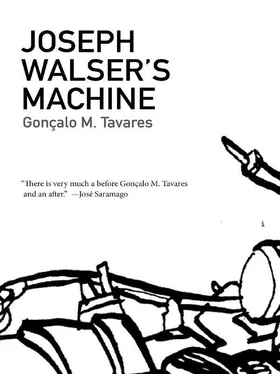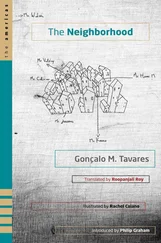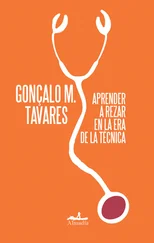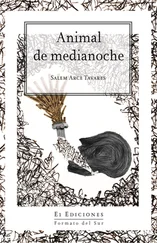Gonçalo M. Tavares
Joseph Walser's Machine
The shock of the similar …
— MARIA FILOMENA MOLDER
He wanted to say the Lord’s Prayer, but all he could remember was his multiplication tables.
— HANS CHRISTIAN ANDERSEN
TRANSLATOR’S INTRODUCTION
Joseph Walser’s Machine (2004) is the second book in Gonçalo M. Tavares’s series “The Kingdom”: four novels connected by a handful of overlapping characters, a number of recurring themes, and, perhaps most importantly, a strikingly odd style. The third novel in the series, Jerusalem , was awarded the prestigious Saramago Prize in Portugal, and the final novel, Learning to Pray in the Age of Technique , was recently awarded the prize for Best Foreign Book in France, which has only ever been awarded to one other Portuguese-language novelist, António Lobo Antunes in 1997. Tavares’s work has also been championed by the old guard of European novelists, including Jacques Roubaud, who read his own translation of Tavares’s stories in an Oulipo meeting, and José Saramago, who heaped hyperbolic praise on the younger writer, stating that in the history of the novel in Portugal there is very much “a before and after Gonçalo M. Tavares.”
The novels in “The Kingdom” series are all set in an unnamed European city filled with streets and characters with vaguely Germanic-sounding names. Within this hazily defined setting, Tavares’s narrators and characters grapple with fundamental questions of human existence (the relationship between humanity and the material world, the behavior of humankind when faced with war, sickness, and death) as well the language with which to express or examine these questions. Indeed, the third-person narrative voice in Tavares’s “Kingdom” novels is unceasingly self-reflexive, wrestling with language in order to describe both simple actions and complex, often paradoxical philosophical notions. As such, the prose in Joseph Walser’s Machine is consistently jarring, abounding with bizarre turns of phrase and circumlocutions. The description of Joseph Walser’s prized collection could serve as well as a description of the narrative voice of Tavares’s novels: “This world which, when viewed from the outside, might seem illogical and strange, was in fact thoroughly ordered; it was a secondary order, one that only Walser could perceive.” The order in Tavares’s books is a bizarre order, a seemingly “illogical and strange” order, but an order nonetheless.
Throughout the novel, Tavares’s narrator describes objects, actions, feelings, and concepts as if they were newly formed, with measurable qualities and definable characteristics, yet without names or rote phrases to accompany them. As such, we end up with descriptions of wartime that eschew terms like “bullet” or “shrapnel,” as in the following passage: “a few hearts pierced by shiny pieces of metal, damned by a material that is far from useless in war: a dense substance incompatible with life.” At other points in the novel, the narrator refuses to name a concept until after the peculiar particularities of it have been articulated, as in this strange description of an idea as commonplace as “weekend fun”: “Saturday night the city takes on an odd logic; a schizoid personality becomes readily apparent in men who are able to move straight from their loathsome days into occupying themselves, remorselessly, with nonstop dancing and dim, arousing lights. People are having fun.” There is a cool, almost scientific detachment in this sort of prose, as if the narrator were examining human behavior for the first time, without the linguistic baggage and habitual terms and phrases bequeathed by the history of a language. The narrative voice is free of ready-made opinion or moralizing, for certain, but it is also free of that which many readers and all nonreaders demand from their books: instantaneous intelligibility.
Tavares’s evasive narrative strategies call to mind what Viktor Shklovsky says about Tolstoy in Theory of Prose . Shklovsky argues that everyday language tends toward the routine, the clichéd, the automatic, and that the function of art is to force us to see with fresh eyes, to “return sensation to our limbs.” To that end, Tolstoy employed a strategy that Shklovsky calls “enstrangement,” through which he forced the reader to hear language anew, to be jarred into consciousness by poetic language, which subverts and distorts and destroys automatic, everyday language. Shklovsky then goes on to describe a method of enstrangement utilized by Tolstoy that could equally be used to characterize the narration in Joseph Walser’s Machine : “[H]e does not call a thing by its name, that is, he describes it as if it were perceived for the first time, while an incident is described as if it were happening for the first time.” In the world of Tavares’s novel, such historically and politically loaded topics as war, military occupation, violence, and death are described as if they were occurring for the first time, divorced from both their historical resonances and their usual linguistic milieus. As such, the narrator struggles to find the precise terms, phrases, or metaphors to describe the action of the novel, at times expounding at length about a strange new combination of adjective and noun, at others practically giving up on the possibility of language to reveal or convey meaning, as in this one-off description of the tempo of war: “The war continued apace: like a lunatic, or maybe like some other thing.” Tavares’s prose refuses to follow the smooth, automatic routes of everyday speech, instead opting for the more treacherous terrain of new poetic formulation. Shklovsky’s definition of poetry — which included literary prose as well — is a concise description of Tavares’s narrative style: “impeded, distorted speech.”
Translating Gonçalo M. Tavares, therefore, is an exercise in resisting temptation, the oddly persistent temptation of clear, everyday language. The “impeded, distorted” prose of the “Kingdom” novels puts the translator in a tough spot, stuck between the Scylla of the near-sacred original text and the Charybdis of the eventual thoughtful reader. On the one hand, the translator reveres the original text and its uniquely stilted inner weave, and on the other, she looks forward to the promised reader, who, at long last, will justify the book. There is an impulse on the part of the translator to coddle the reader, a temptation to smooth over the very elements that make the book bizarre or original, those elements that would restore the reader to her senses. With Tavares, the temptation is to convert such odd turns of phrase as “a few hearts pierced by shiny pieces of metal, damned by a material that is far from useless in war: a dense substance incompatible with life” to something more palatable, more automatic, like “a shiny piece of shrapnel, a valuable tool in wartime.” Or convert “a dense substance that is incompatible with life” into “bullets, which take human lives.” Yet giving into the temptation to render Tavares’s prose in the automatic English that would set a reader’s mind at ease would be at once to obliterate the nuance of the original text and to do a disservice to the reader, preventing her from experiencing the wholly new sensation of this strange book. It is the translator’s duty to resist this temptation, especially in the case of those sorts of books we call literary, avant-garde, or subversive, whose value lies precisely in their transgression of aesthetic and linguistic norms.
RHETT MCNEIL
2012
Читать дальше












